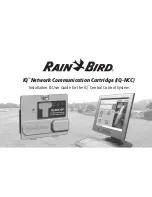
10
USER MANUAL
▪
Red Rooster Lifting Limited
▪
Nauta House, The Meadows, Oldmeldrum, Aberdeenshire, AB51 0EZ
▪
Tel: +44 (0) 1651 872101
▪
M01-AH27 REV2
GETTING STARTED - HOIST CHECKS & INSTALLATION INSTRUCTIONS
1.7
HOIST CONTROLS
Air hoists can be controlled by either a pull cord or a pendant control operating the spool valve of the hoist operating raise and lower. The
diagram in section 1.8 shows the set up for both types of control and the location on the hoist body.
Cord or pendant hose lengths should be long enough for the operator to stand away from under the load but still with the cord toggles or the
pendant suspended at a height of around 1 metre from the operating level. Where the controls have to be to the side of the hoist or
where the operator cannot see the load travelling the full range of the lift a banksman should be appointed to assist the operator using a
reliable means of communication.
Both toggles on the cord controls should be marked for correct operation of the hoist. The emergency stop button on the pendant control
should also be marked.
1.8
ADDITIONAL INSTALLATION INSTRUCTIONS
Hook suspension with long chain drops.
Problem:
When a long heavy chain is fitted, and the ‘raise’ is pressed with the hoist in an unloaded condition, due to the centre line of the hoist having
been affected by the weight of chain, the upper limit switch, may fail to operate. In addition, the slack load chain may on some modules foul
the limit lever arms, thus preventing it from returning to the centre (neutral position).
Resolution:
A short length of wire rope, 6mm diameter, is fitted to the hoists and bulldog grips have been supplied.
Suspend the hoist in its final location and with as much chain as possible in use. Apply a small load to the hoist and lift it clear of the ground.
Connect the wire rope sling to the support steel alongside the top hook using bulldog grips.
The tension in this sling should be enough to counteract most of the weight of the slack chain produced in the fully raised position, but it must
not be tensioned such that it is carrying any of the load supported by the hoist. i.e. if fitted correctly, in an unloaded condition, the sling will be
tensioned with the hoist ALMOST in the vertical position. When the load is applied, the tension in the sling will be slack.
THE SLING IS NOT CAPABLE OF HOLDING THE LOADS CARRIED BY THE HOIST











































